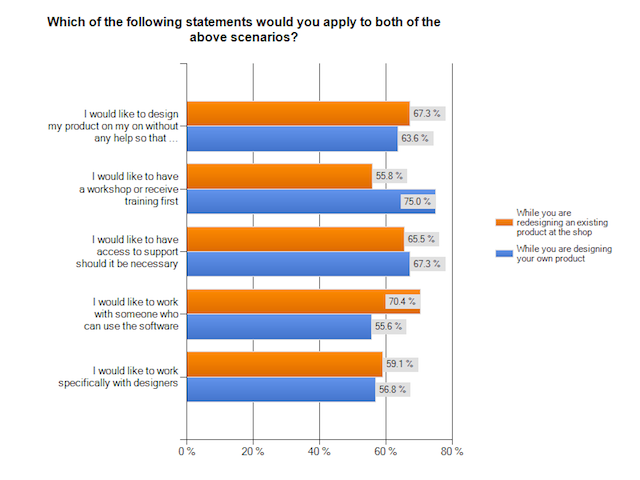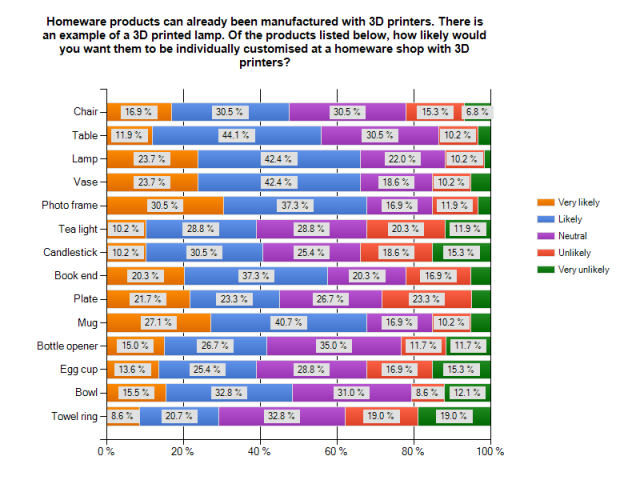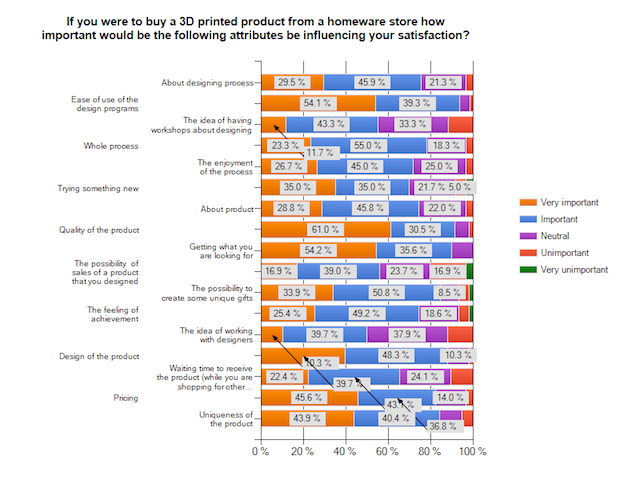Aysu Bozkurt is an industrial engineer who studied MSc in Global Marketing in London School of Business and Finance. While researching a topic for her dissertation she discovered 3D printing and became passionate about the technology, the sector and consumers. Her dissertation focused on the effects of customising homeware products using 3D printing and how this effects customer satisfaction and brand loyalty of UK homeware consumers.
As part of the research for my dissertation, I conducted a UK-based survey targeting consumers of homeware products to better understand consumer attitudes towards customised homeware products and where 3D printing technology could be applied within this context. The survey covers a small sample, however I do believe that it provides valuable insight into consumer requirements in this market area and also points to more specific areas that can be researched further.
Here are some highlights from the survey:
I think the most striking figure for me was that 67.7% of the respondents had seen or heard about 3D printing and understood the concept. When asked about customisation applications and design software there were similar responses from those surveyed. 51.6% of respondents, indicated that they would like to download an application and try it for themselves, while 29% of them were unsure. For the design software itself, 53.3% of respondents indicated that they would like to download and try the software, while 26.7% of them were unsure.
Figure 1: Drivers for customer satisfaction during the design process
In this respect, one of the main drivers for consumer satisfaction is the ability to design their own product, with 59% of respondents very likely and 31.1% of respondents likely to be satisfied with this feature. Another essential driver here was ease of use. However, ‘feeling like a designer’ was of little or no importance to respondents.
Figure 2: Choices for design environment
The survey presented respondents with a specific scenario:
As a customer you can use 3D design and 3D printers to personalise your own homeware products at shops like IKEA with two options — a) customising an existing design or b) design their own product from a blank screen.
For option A there were two notable results: 70.4% of respondents would like support from someone on hand and 67.3% of the respondents would like to redesign an existing product by themselves, without any help, with user friendly software.
For option B, designing their own products, 75% of respondents would like to have a workshop or training before they begin designing and 67.3% of them would like to have access to support should it be necessary.
On the other hand, working with a designer is not desirable for either option.
Figure 3: 3D printable homeware products and their desirability to be printed
When respondents were asked which products they would like to customise with 3D printing, they were presented with a range of choices. Figure 3 illustrates the results.
Figure 4: Drivers for customer satisfaction from 3D printed customised homeware products
Figure 4 indicates that 55% of respondents would likely be satisfied with the whole process. The main drivers for satisfaction are quality of the product (61%), ease of use of the design programs (58.8%) and getting what they are looking for (54.2%). Subsequently, drivers that are likely to affect customer satisfaction include design of the product (40.3%), potential to create unique gifts (50.8%) and the feeling of achievement (49.2%).
A significant proportion of the respondents (37.3%) think that working with the designers during the design process is unimportant.
Figure 5: Indicators of loyalty
In order to understand the connection between customer satisfaction and brand loyalty, three indicators were asked of respondents. Figure 5 indicates very positive responses to the 3D printing concept in terms of customisation and satisfaction.
Conclusion
Conclusion: This small scale research focused on the UK consumer homeware market and 3D printing. The majority of the respondents had heard about the technology and would likely adopt it in some level, especially due to customisation abilities for various products.







